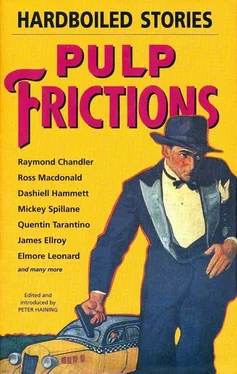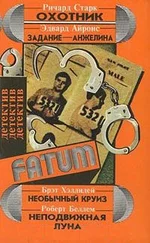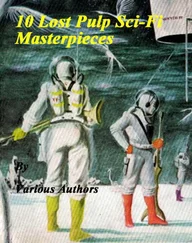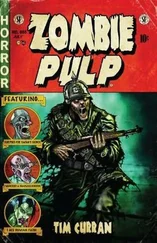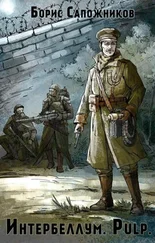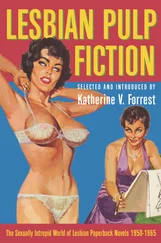‘We cannot. But we can soon get a list of the folks who registered today, and their room numbers. And after that, in case we run up against a snag, your kid brother that once was a sparrow cop in a park — well, he’s got an idea. And I’ve observed that his ideas are apt to be good.’
‘What is this idea that he has, inspector?’
For reply, Nick displayed some very small, silvery fragments in the palm of his big hand. They were egg-shaped bits crusted with a strange and frosty deposit, and none of them was longer than three-quarters of an inch. ‘Over there on the sidewalk, beside that alley,’ his polite voice announced.
‘Them!’ snorted Dave Glennan. ‘ Them! What the hell! What’s the worth of those? Nicholas, why don’t you turn in your badge and gun, and become a member of the white wings? You scavenger, you.’
‘Well,’ said Nick, ‘I’ve seen them before. And many of them.’ He dropped the fragments into his vest pocket.
‘We’re wasting time,’ Inspector Bourse announced.
The chambermaid — Number Seventy-two, she was, of the Aberdeen Hotel — had plenty of nerve. Really she didn’t need a lot of nerve, since she wasn’t compelled to place herself within range of direct gunfire. When Nicholas Glennan tapped softly upon the door of Room 1661, and an answering bark came from inside, the woman controlled her quivering throat adequately.
She crouched close beside the thick wall and said, ‘Chambermaid.’
The man inside the room seemed waiting for something. Finally he spoke in a voice full of annoyance. ‘I don’t need you, girlie. Trot along.’
For a fatal moment there was silence in the hall, and inside the room.
‘Just to clean up your room, sir.’
There had been people outside the door, up there in Dorchester Avenue — milkman, laundryman — the door had been opened, and the law had come. Chet Hemingway wasn’t taking a chance in the world.
He snarled, ‘Run along and peddle yourself some place else!’
Gently, Nick Glennan drew the frightened chambermaid round the corner, past the house detectives and the group of hard-faced officers from headquarters. ‘What he says is good advice, lady,’ he murmured. ‘You’d better go.’ There was a tense shuffling of feet on the thick rug.
Glennan looked coolly into the eyes of a brother detective. ‘It’s him?’
‘Sure. His voice. I was a witness in KC when they had him up for trial. Know it anywhere.’
‘Okay,’ breathed Nick Glennan.
He said, ‘Hemingway. Are you going to come out, or do you want to be carried? Last fall we said that to some hoods, and they decided to stay. We carried them out and embalmed them. What do you say?’
In 1661, Chet Hemingway took out his two guns and turned towards the door. He fancied how it would look, in the headlines. ‘I say come and get me, if you’re man enough!’ He put a heavy slug through the door.
‘I am,’ responded Nick, ‘and here... I... come.’
A machine gun was lifted, but Nick’s gesture stayed the ready finger. ‘No,’ he muttered, ‘I missed him — twice. This time it’s me or him.’
He took care of the lock with his first three bullets, and heavy pebbles of lead gouged whole strips out of the veneer as he kicked against the wrecked door... Inside, there was the distant slam of the bathroom door, so Glennan braced his whole body against the big slice of wood which blocked his way. He crashed to the floor, the sundered hinges flying wide. The bathroom door opened a crack, and in that crack was a jet of dancing flame... turned out the lights... well, one of them, there in the dark.
Flat on the floor, with the air splitting beside his ears, he took steady aim at a point above the flashes, and scattered his three remaining bullets there. There was sudden silence — a cough, and then the sound of a body falling into a bathtub.
They switched on the lights, and sniffed in the doorway.
‘He got Glennan.’
‘The hell he got Glennan,’ said Nick. He climbed to his feet and pushed the bathroom door wide. For one in Hemingway’s messy condition, the bathtub was a very good place for him to be sprawled.
Inspector Bourse looked at the corpse.
‘You must have second sight,’ he muttered.
‘No indeed, sir. It was the shells.’
He found them in his vest pocket, and juggled them in his hands.
‘Pistachio nuts,’ somebody said.
Nick Glennan nodded, soberly. After all, Hemingway had been a man and now he wasn’t anything. Rest his soul, if possible... ‘The nut shells was all over the sun parlour, up on Dorchester Avenue,’ he said. ‘They was also scattered on the sidewalk tonight where he waited for the inspector. He was a pig for them, it would seem. When the bell-boy said that the man in Room 1661 of this hotel had sent twice for pistachio nuts during the day, it had to be Hemingway and no other. Probably he’s feeding on them this minute, wherever he’s gone.’
‘I’ll answer that,’ remarked his brother, grimly. ‘If Hemingway is eating pistachio nuts this minute, he’s eating roasted ones.’
Dead on Her Feet
Cornell Woolrich
Although Cornell Woolrich, who also wrote for Detective Fiction Weekly, had no brushes with the law like those of his fellow contributor MacKinlay Kantor, he had a very different opinion of New York’s cops, and a recurring feature in his stories is the attempts by policemen to fix evidence, to subvert justice and to use brutality to intimidate both the innocent and the guilty. Writing of this, Woolrich’s biographer, Francis M. Nevins, has said, ‘The overall impression he creates is of a human power just as brutal and malignant as the dark powers above, indeed their earthly counterpart — and the characteristic means of evoking this impression is by portraying incredible police brutality and its casual acceptance as completely natural by everyone, including the victims.’ There are, in fact, dozens of such stories to be found among the hundreds that Cornell Woolrich wrote for the pulps — for example, ‘The Body Upstairs’ in which some officers stick lighted cigarettes under a suspect’s armpits; ‘Graves for the Living’ where a man being questioned has acid tipped over him; and the terrifying ‘Detective William Brown’ who beats a prisoner almost senseless and then taunts him with a glass of water which he pours gloatingly onto the floor just in front of the man. A similar kind of casual violence is also to be found in his novel The Bride Wore Black (1940), in the person of the homicide cop, Lew Wanger. Even the environment in which these men work — especially the sparse and dingy back rooms of the precinct stations — is portrayed in a style that is unique among the pulp writers.
The life of Cornell Woolrich (1903–1968) was every bit as bizarre as his stories. His childhood was spent being shuttled backwards and forwards between his mining engineer father who worked in Latin America and his New York socialite mother. He began writing while still at college, and his first published work, Cover Charge (1926), was an attempt at a Jazz Age novel in the style of his literary hero, F. Scott Fitzgerald. This provided him with an entrée to Hollywood where he was briefly married to the daughter of the veteran producer, J. Stuart Blackton. The marriage apparently lasted only two weeks and was allegedly unconsummated; whereupon Woolrich, who may well have been homosexual, fled back to New York. Here he was to spend the rest of his life, closeted in one hotel room after another with his overbearing mother. Although this strange bond undoubtedly contributed to Woolrich becoming a recluse, he wrote prodigiously and soon earned himself a reputation in the eyes of a number of critics for being able to create ‘an atmosphere of terror equalled only by that of Edgar Allan Poe’. After the death of his mother in 1958, his own health collapsed and in his last years he was both a diabetic and an alcoholic. When he, too, died, a lonely and embittered man confined to a wheelchair by his infirmities, he left an estate in excess of a million dollars.
Читать дальше
